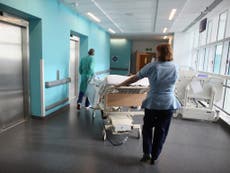The day I found out my son had a rare and debilitating genetic disease is forever etched in my mind
It all began to add up: the fascination with water, the enormous laugh, the flapping arms… every singularity of his behaviour matched the description of this rare genetic condition

For 40 years, February never had any particular significance for me. But on 10th February two years ago, my world turned upside down.
That day, I had an assignment in London.
When I left the studio, I switched my phone on. There was a message. It was from an unknown number.
I exited down the back street and walked to the main road. It was raining heavily. If I didn’t run to the station, I knew I was going to miss my train. So I raced along in the rain, listening to the message. It was my son Dexter’s paediatrician: ‘I will call you back’. That’s all she said.
From that moment, my heart started pounding. I dashed across Victoria Station, caught my train at the last minute.
Suddenly, it was quiet. I took a sit in a set of four, next to children chatting. I had a feeling that I need to be protected. I took a breath. I looked at the time. It was 2.48pm. I called the paediatrician. It was immediate. ‘He has Angelman Syndrome.’
The only thing I could say was, ‘Oh my God.’
Then I thought to myself: Why are you saying that? Is that all you can say, really? ‘Oh my God’?
She asked me where I was. ‘On a train.’
I could hear her guilt, the horror that this had fallen to her, to give me this news. I quickly wonder if she had been trained to do this, if there even is a right way to go about it?
‘Thanks for letting me know.’ I hung up.
Nothing had changed on the train. But my life had stopped. It would never be the same again. Everything felt white, and diluted. I could feel contractions, almost like childbirth contractions, in my stomach. I was giving birth to this new child, the one with a syndrome.
For five minutes, I was the only one who knew. My child has Angelman Syndrome, AS, and it’s forever.
My child won’t talk. What will happen to him when I’m not there? I took another breath. I was ready to tell my husband.
I called him. He picked up. I had to hurt him, I had to tell him this thing about his son. I told him straight away. As softly as possible. I was alone, on this train. He was alone, somewhere in Brighton.
Did I cry? I don’t think I did. I was stunned. The train pulled in the next station, and I was sitting on it, petrified.
Diagnosis is devastating, but I wonder if waiting to find out what’s wrong is not worse. While you’re waiting, something is happening to you that you never thought would happen. You don’t know what it is that’s happening, but you know you’re filled with fear.
It all began to add up: the fascination with water, the enormous laugh, the flapping arms… every singularity of his behaviour matched the description of this rare genetic condition.
I felt my heart sink to my shoes as I read about the delayed development, the language and speech impairment, the movement and balance problems, and the epileptic seizures.
I also read that only around 1 in 16,000 people have it. So it’s pretty rare.
Children with AS are very smiley. They have something angelic about them, so the name is fitting.
Every day I see my son create bonds with people on the street, and I see their faces light up. Although his smile belies a troubled heart. It’s so easy to believe that everything’s okay for him. But he has to work very hard every day to do simple things, like bringing a spoon to his mouth or walking without falling.
Two years ago, I was stunned by the life-changing news I had finally been given.
Luckily I found a free befriending service run by the disability charity Scope, which connects parents of disabled children with each other. Suddenly I could talk to someone who understood. It’s important, because you can so easily close up like an oyster, and withdraw. I almost did.
Now February has two significant days in my life: International Angelman Day and Rare Disease Day.
I embrace them wholeheartedly.
It’s painful, because it’s a reminder that my son is different.
But it’s also an occasion to celebrate him, and everyone out there who has a rare disease.
He, who is called Dexter and has no obvious dexterity, also has a kind of dexterity that no one else has. He cannot walk, but he can climb faster than me. He cannot memorise words, but can remind his dad to not forget his phone when he leaves.
He, with his skin of eerie softness, his pure mind, and streaks in his hair which look like traces of God’s fingers, can embrace the two of us, and make us look at each other. It feels like he’s meant to be here.
Today, on Rare Disease Day, I am celebrating everything that is rare and precious about him.



Join our commenting forum
Join thought-provoking conversations, follow other Independent readers and see their replies